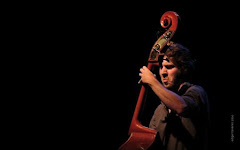 |
| Photo: Antonio Porcar Cano |
His third release for Sunnyside Records, "Sounds of Love", was recorded live in Lugano, Switzerland on March 27, 2013. Hébert leads a most interesting lineup –– pianist Fred Hersch, alto saxophonist Tim Berne, cornetist Taylor Ho Bynum, and drummer/ percussionist Ches Smith –– in a six-song set that includes four originals as well as two classics from the pen of the great bassist, Charles Mingus. The longest piece on the program (12:31) is Mingus's "Duke Ellington's Sound of Love" which opens with Hébert in a conversation with Smith. They dance around each other for 90 seconds before the percussionist drops out and the bassist goes on alone for another three minutes. The band, sans Berne, enter with Bynum playing the theme and Hersch harmonizing around him. The alto saxophonist takes over the theme for several lines before he and Bynum play the theme in harmony. Hersch steps out for a sparkling solo then Bynum creeps in for a delightful turn, softly twisting his lines around the bass and piano as his cornet moves into and out of the melody. Berne returns to play the melody while Hersch dances like a sprite beneath him.
 |
| Photo: Western Michigan Univ. |
The other Mingus tune, "Remember Rockefeller at Attica", opens with Bynum squeezing harsh notes out of the cornet with the alto sax in the background. Smith enters, Bynum exits, there is now even more urgency in the piece as the drummer slowly but steadily builds his solo. Smith pushes the song into the "hard-bop" gear, the rest of the band enters and it's off to the races. Berne jumps out in front and into a conversation with Hersch and Smith while Hébert keeps the song on track. Bynum is next, with notes exploding out of the cornet then stepping aside for the piano solo. If you are used to the more melodic side of Fred Hersch, he can really "get down" when the music calls for it.
This is not to take away from the leader's music. "Constrictor" opens the album with Bynum, his muted cornet shouting at the audience until the rest of the band quietly enters. He keeps rolling while Smith and Hébert scramble beneath him. Berne enters and the music begins to take shape with a regular pulse. Smith's rollicking drums opens "The Blank-Faced Man" until the bassist's rapid-fire lines actually lowers the intensity. The rest of the band enters as if playing a second prologue untill the bottom falls out for a solemn interaction between alto and bowed bass. When Hersch reenters, his dream-like reverie plus the overtones coming from the bass lay the foundation for a handsome Gamelan-like melody played by alto sax, cornet, and percussion.
"Sounds of Love" ends with "Frivolocity" – Hersch leads the band with another delightful solo turn before the rhythm takes on a quasi-Caribbean feel. Playful solos by Smith and Bynum, together and separately, play off the lively stop-start rhythm with a quick turn to a ferocious "walking" tempo. The song goes back and forth rhythmically with a short return to the theme and then out.
Not sure why this music nearly nine years to an album release but, be that as it may, this is an excellent album. John Hébert is not only a fine musician but knows how to shape compositions so that they have a personality of their own. It hurts not one bit that his comrades-in-music are also great players and able to move through the music with creativity and wit.
For more information, go to www.johnhebert.com. To hear more and to purchase the album, go to https://johnhebertbass.bandcamp.com/album/sounds-of-love.
Dig into "Frivolocity":
 |
| Photo: Anna Yatskevich |
McCaslin's "Page One" opens the program. After a sombre piano, bowed bass, and vibraphone entrance, Royston and Kozlov kick the band into high gear with an energy level that rises from the rhythm section up. Gillece's solo, playing off the thick piano chords gleefully rolls forward until Hirahara takes over with his own joyous romp. The leader's finger-snapping solo follows goosed on by Royston's thunderous drums. McCaslin takes the piece out on the original melody. He trades his tenor sax for flute, Kozlov his acoustic for electric bass, for the bassist's "Flow", a lovely ballad sans piano and Royston on hand percussion. Later in the program, McCaslin returns to the flute with the pianist moving to organ for the leader's "Once a Fog in Brooklyn", a medley of Russian folk tunes Kozlov remembers from his youth. McCaslin returns to tenor for his solo over the pattering drums and burbling organ. The exciting ending has such an uplifting and infectious feel.
 |
| Photo: Anna Yatskevich |
After listening to "First Things First" several times, a number of thoughts became clear: 1)- what a great ensemble; 2) - how great the music sounds; and 3) - one hopes Boris Kozlov makes albums as good as this one on a regular basis. Dig in and dig this music!
For more information about the bassist, go to https://vpa.syr.edu/people/boris-kozlov/. "First Things First" will be released on 1/21/2022.
 |
| Photo: Edgar Tavares |
 |
| Photo: Baden Powell 1970s |
The album closes with Duvinau's piece "For Bill & Baden" which opens with a melody influenced by Thelonious Monk and the blues. Pay attention to Fields piano below Frisell's delightful solo as well as during Drewes exuberant soprano sax spotlight – the pianist rises above the rhythm section for a fine ramble. It's a sweet close to a very pleasurable listening experience.
Hopefully, Gui Duvignau, with his explorations of the music of Baden Powell, will pique people's interest into checking out the Brazilian genius. To his credit, Duvignau truly shares the spotlight with his ensemble through the 74-minute program while still showing off how melodic and supp ortive a musician he is. "Baden" is quite good!!
For more information, go to www.guiduvignau.com. To purchase this album, which will be issued on 1/21/2022, and others by the bassist, go to https://guiduvignau.bandcamp.com/.
Here's the bassist's "Mata Adentro":









No comments:
Post a Comment